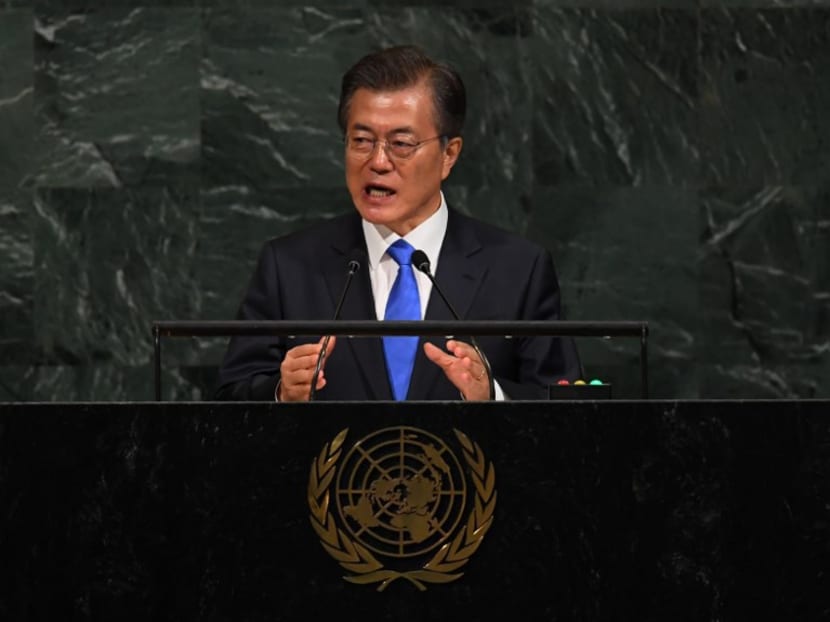Populist pledges add to pressure on S Korea’s Moon
SEOUL — It has been just five months since South Korea’s President Moon Jae-in took office promising to boost wages and reduce inequality, having campaigned on a populist platform designed to woo voters weary of falling living standards.

South Korea’s President Moon Jae-in took office by campaigning on a populist platform. But critics question whether his approach, which involves generous welfare handouts, higher wages and job creation, will revive the stalled Korean economy. Photo: AFP
SEOUL — It has been just five months since South Korea’s President Moon Jae-in took office promising to boost wages and reduce inequality, having campaigned on a populist platform designed to woo voters weary of falling living standards.
But Mr Moon, keen to transform the economy by reducing its reliance on the big family-run conglomerates known as chaebol, is already running into problems.
Critics question whether his approach, which involves generous welfare handouts, higher wages and job creation, will revive the stalled Korean economy — and whether the country can afford it.
While the chaebol have driven two decades of export-led growth, recent low growth and a fast-ageing population have fuelled concern that South Korea’s economy could echo Japan’s “lost decades” of stagnation.
The Korean economy grew 2.7 per cent in the second quarter from a year earlier but high household debt has inhibited consumption.
Government policymakers say a new approach is needed for the Korean economy, as they believe fat corporate earnings do not trickle down to working and middle classes.
“If the government can spend now to change the economy’s paradigm and reduce any social costs that may rise in the future, then it’s more effective to spend,” said Mr Kim Dong-yeon, finance minister.
“Mr Moon is viewing depressed domestic consumption as the main culprit for the country’s low growth,” says Mr Lee Sang-jae, economist at Eugene Investment & Securities.
“He is desperate for a paradigm shift as the country could repeat Japan’s mistake if structural problems are left unaddressed.”
Already, the government has passed a US$10 billion (S$13.6 billion) extra budget plan to help create public-sector jobs, and proposed a record US$380 billion budget for next year — the biggest increase in nearly a decade — to fund higher welfare spending.
It also plans to boost basic pensions, expand healthcare, childcare subsidies and unemployment benefits, boost minimum wages by 15 per cent a year to Won10,000 (S$11.9) by 2020 and put most contract workers in the public sector on the permanent payroll.
Mr Moon’s populist policies have gained strong public support, with his approval ratings hovering near 70 per cent.
“No matter how much money these big companies make, this doesn’t seem to make my livelihood any better,” says Mr Lee Jung-woo, a 33-year-old office worker.
“I hope that Moon’s new policy will bring changes.”
However, analysts question how the government plans to fund the expanded welfare programmes, saying the selective tax increases on large companies and high-income earners proposed by the government would not be enough to cover an expected budget shortfall.
The government estimates that the expanded packages would cost about Won178 trillion, or 10.4 per cent of GDP over the next five years. But it says its fiscal balance would remain healthy as new spending would be financed by higher tax revenue and by streamlining existing spending.
However, Mr Oh Seok-tae, analyst at Société Générale, says that “without comprehensive tax hikes, we could see a hole in our balance sheet in the long term”. Big businesses also fear Mr Moon’s economic policy could undermine the competitiveness of Korean companies.
“Our economy is mainly driven by exports,” Mr Kim Dong-wook, head of the Korea Employers Federation, recently told YTN radio.
“If wages rise, production costs will rise, weakening our export competitiveness. This will sap our economic vitality in the end.”
Meanwhile, some economists doubt Mr Moon’s redistributive policies will spur enough consumption to drive growth. “Without a catch-up in productivity, faster wage growth ahead would mean more pressure on unit labour costs,” DBS said in a recent report.
“Tax hikes and tighter regulations on chaebols … would damp the incentives to invest.”
They stress that a greater focus should be placed on measures to boost labour productivity and deregulate the under-developed service sector. “Such measures may take time to reap results but would go a long way in driving a sustainable growth recovery,” Morgan Stanley said in a recent report.
Mr Jiwon Lim, economist at JPMorgan, agrees that the government should consider making the country’s rigid labour market more flexible. “If the government focuses too much on redistribution without structural reforms, the country may end up having to divide up a shrinking pie of prosperity.” THE FINANCIAL TIMES






